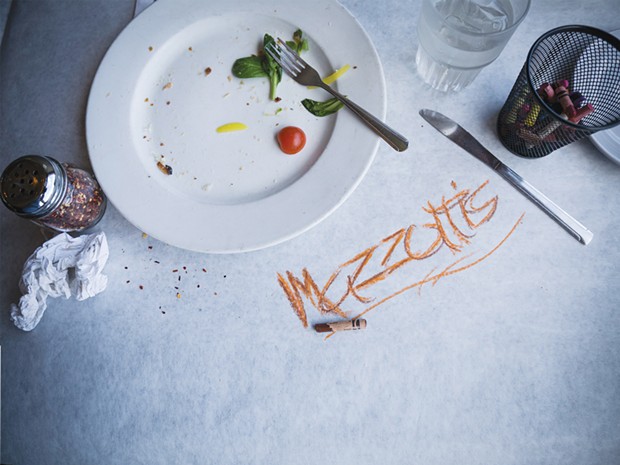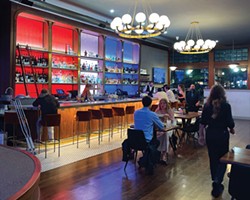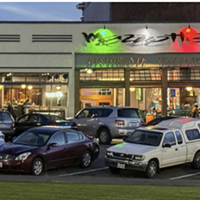'Did Your Check Clear?'
Mazzotti's closure leaves employees unpaid and adrift
By Jennifer Fumiko Cahill [email protected] @jfumikocahill[
{
"name": "Top Stories Video Pair",
"insertPoint": "7",
"component": "17087298",
"parentWrapperClass": "fdn-ads-inline-content-block",
"requiredCountToDisplay": "1"
}
]
As word spread of the abrupt closure of the Arcata Mazzotti's, there were the usual responses: laments and nostalgia, criticism and speculation. Longtime patrons shared memories of dinners and celebrations going back decades, lamenting the loss of a Humboldt institution, echoing the response that followed the 2019 shutdown of the restaurant's 42-year-old Eureka location. Conversations and social media were rife with speculation about why the Arcata institution shut down, who might take it over and where locals were now going to get their lasagna and herbed butter.
But conversations among the restaurant's staff of 40 voiced more dire concerns. Employees, some of whom say they had not been paid in a month and had already been pushed to the financial brink, were left with no way to pay bills, cover rent or to buy food. Employees who joined a group walk-out on Jan. 11, which hastened the permanent closure of the restaurant, saw it as their last option.
Owner Joe Mazzotti, 54, blames the financial toll of the pandemic, summer fires and a post-cannabis economic downturn following an expensive renovation for late payments and bounced checks to both employees and vendors over the last year. However, more than a half-dozen employees interviewed for this story say frequent payroll problems go back further and feel Mazzotti's public responses to their complaints and the restaurant's closure have added insult to injury.
The original Mazzotti's Italian Restaurant opened in Huntington Beach, California, in the 1970s. Members of the Mazzotti family moved north to found the Eureka restaurant in 1976, a popular pizza and pasta spot Joe Mazzotti took over in 1994, still in his mid-20s. In 2002, he expanded the family business to 773 Eighth St. on the Arcata Plaza, where the house was packed with diners and audiences for live bands, and for years hosted the judging for the annual Oyster Festival. Like most restaurants, the COVID-19 lockdown, closures and shifting regulations hit the business hard, prompting Mazzotti to try various things to bring in revenue, including a crowdfunding effort and selling gift cards in advance of its eventual reopening.
Then, in a surprising move, in 2021, Mazzotti embarked on a massive renovation meant to transform the spacious but dowdy room to provide a more upscale dining experience and nightlife venue.
"Renovation was about $850,000," he says, noting the building dates back to 1892, and the foundation, kitchen, plumbing, electrical, flooring and subfloor all had to be redone. Other changes, like the new bar and multi-colored lighting behind it, were aesthetic choices. "There wasn't anything we didn't touch in that place," Mazzotti says, estimating the floors and tiling cost $42,000, while kitchen improvements and equipment took another $20,000. The sound system, which he notes is state of the art, cost in the neighborhood of $30,000. The centerpiece was a new bar custom made by Blue Lake's Wallace & Hinz Bar Co., the final bill for which came to approximately $130,000.
"Hindsight is always 20/20," says Mazzotti, looking back on the expense. "So, of course, there are times that I think that I could have done a smaller bar, redid the bar in the former location. ... I probably didn't need to do some things." But he says the restaurant was "beat up, it was only really worth the liquor license," and he wanted to "give Humboldt a new experience."
Mazzotti points to summer wildfires that stopped the flow of visitors from Redding and beyond, bringing restaurant revenue down 40 percent over the summer. That, he says, was followed by the worst winter he's seen in his books, making it harder to recoup funds spent on the renovation. Recalling the $200 cash tips cannabis growers used to hand out, he also says the loss of the once flush illicit-market economy, coupled with rising rent and food costs, has been tough on business in general over the past several years.
Those same factors were impacting Mazzotti's servers, bussers and cooks, many of whom live check to check, like most in the food service industry. Unfortunately, many of those checks didn't clear, according to employees who spoke to the Journal under condition of anonymity, fearing being identified may harm both their future employment prospects and the chances of Mazzotti paying them what they are owed.
"That had been an issue since I got hired ... back in 2022," says one worker, adding they were warned about the issue by other people before taking the job but needed the work. A kitchen staffer says they worried constantly about "if the owner would have money in the account, and lots of my coworkers and I were afraid if we'd actually have money." The employee estimates at least eight of their paychecks bounced, adding they were sometimes paid directly out of the till.
A career server who says they've never had difficulty getting paid elsewhere claims it was a chronic issue during their tenure at Mazzotti's. While they did take home cash tips, they say they were sometimes told by the bank there were insufficient funds in the payer's account. Other times, they say they were told by management they couldn't cash or deposit a check yet, and another time a bounced check led to an overdraft fee. Among staff, they say, "This was the common conversation: 'Did your check clear?'" Still, they say, "It would always work itself out and we're a family, and we were very understanding."
One cook says at least 10 of their checks bounced, and that delayed or returned checks have been an issue for at least two years. To avoid overdraft fees, they say they stopped trying to deposit checks and would cash them instead so the bank could just send them away empty handed if there weren't enough funds to cover their two-week paycheck. The next step, they say, was to contact Mazzotti, who might tell them when the check would clear, pay cash or send money via Venmo or Zelle.
Even before the paychecks stopped coming entirely in December, the delays and uncertainty made living on a restaurant worker's income harder, former employees say. Some say they have faced imminent eviction or moved in with family because they'd fallen behind on rent or been unable to pay entirely. The cook says their wages were higher than most, but they were still spending 40 percent of it to cover rent on a modest apartment.
A front of house worker says they've missed car payments due to delayed checks and recently had to move back home with their parents, acknowledging how lucky it is to have the option of family assistance. Not all their coworkers have access to help, they say. Previously, the employee had been living with friends but says there were times they were unable to pay their half of rent and utilities, with one check over the summer taking two weeks to clear. The employee says they'd get back on track only for it to happen again. While their friends were understanding, the employee says it was "just an embarrassment" to be unable to pay and rely on their friends' patience.
At one point, says the career server, cash tips were not enough to make ends meet while waiting on a check for their base pay. "I had $2 in my wallet." With kids to feed at home, they say they got groceries at Food for People's food bank. "I've worked my ass off," the server says, taking a breath. And while they also saw their colleagues scraping by between checks, the server says, "It affected my emotions, my confidence."
Mazzotti says he's taken out loans to cover expenses at the restaurant, but the money would "dwindle down" and he'd have difficulty paying employees, especially when an expense like federal tax payments cropped up. He admits there have been problems paying both employees and vendors over the last year, but says he was open about it with employees and they'd work through rough patches together. For example, he says he'd sometimes ask staff if they could wait a couple days to cash a check and they'd respond it was no problem. Sometimes, he says, he'd ask higher paid employees to hold off a bit so lower paid employees could get their money first. Beyond that, he says, there was little else he could do. "Oh, I'm just gonna go sell my truck and pay payroll?" he balks.
"I'm not the only business with checks bouncing," Mazzotti continues, dropping names of restaurants he's heard have had trouble paying employees and vendors. And compared to the rest of the county, he says, pay at his restaurant was high, noting line cooks made $19.25 an hour. "People come to me and ask, 'Can I get my paycheck?' And they go and they have no idea what it takes to run a business."
Asked about employees who were unable to deposit 10 checks or more, Mazzotti doesn't dispute the claim. But he says he paid employees' overdraft fees in such cases, adding employees always had the option to leave.
"Did that person willfully stay at that job because it was good enough and did he or she stay on their own accord? I want that stated," he says. "You don't have to stay at a job." After initially offering an analogy about someone being raped 10 times, he relents and switches to another about getting into multiple car accidents on the same road. "But why did they stay 10 times then? Where's their accountability? Why didn't they just go?"
For most of the employees who spoke with the Journal, the answer is that they stayed for each other. They describe the team as a sprawling family with tight units in the front and back of the house. "I did have checks bounce," says the front of house worker, "but the coworkers were like family ... and I think that's the reason that so many stayed on because we had that loyalty, not to Joe, but to each other."
The server agrees, describing the crew as "very connected interpersonally." They recall talking to another staffer in a moment of frustration, asking, "Why do we keep showing up? And she was like, 'I keep showing up for you!'"
The cook says they stayed on when things were tough because "I cared about my coworkers ... and customers," as well as making food, a job they took pride in. The other kitchen staffer says they came in every day "because I wanted to create something," and that working on specials every week was something they were passionate about, work they'd trained for and felt good about.
Sometimes that work was hindered by a lack of supplies, employees say. Keeping ingredients in stock was an issue, says the kitchen staffer, who was responsible for some prep work, saying they'd sometimes learn from a manager that the day's delivery hadn't come. "We'd have to scrap together a list of the most essential items, customers' favorites," the kitchen staffer says, and they got good at a kind of triage approach to the menu when Sysco stopped delivery due to late bills and they'd have to run out to the more costly Safeway or U.S. Chefs.
It was a source of frustration for the cook, too, who says, "We didn't even have enough money to buy pancetta for the carbonara, to buy mozzarella for the pizzas." According to the front of house worker, the bar faced similar inventory issues. Over the last couple weeks, they say, servers had to tell customers they were out of wines like the house red.
An incredulous Mazzotti refutes the claims, saying, out of 62 regular items, "You could always get everything on our menu." He's adamant that late bills and missed deliveries are not emergencies, but normal duties in the running of a restaurant. "It is in [the managers'] job description" he says.
The cook disagrees, saying Mazzotti was often away for weeks or a month at a time, not seeing what was happening at the business. "The main thing for me was ... that he had no idea that his restaurant was in a death spiral. We were struggling to put food in the fridge so we could put it on plates," they say, and serving sub-par food as a result. It made them miserable.
The server says Mazzotti was there every day "until he wasn't. We wouldn't see him for six weeks. Ghost." The front of house worker says, "He would go through spurts where he'd act like he was super involved every day ... he'd help out on the line ... then, poof. He's gone."
Uncertain if their next paychecks would clear, some employees say they were rankled by his absences and long vacations. But Mazzotti is unapologetic.
"That's my choice," says Mazzotti, "if I wanna be a wild party guy this week, if I wanna jump off the side of a mountain and bike down a hill that could probably kill me, [or] put on a suit and go to work for a few weeks." He admits he "isn't great with alcohol" and one period of absence was due to related health issues. But his personal life and his choices are no one's business, he says. Asked if he thinks his absence may have been destabilizing for the business, Mazzotti replies, "I don't owe my employees any stability. All I owe them is the job and the paycheck."
When told some of the employees whose paychecks weren't clearing expressed resentment about his self-described "opulent lifestyle," Mazzotti responds that they "can go find another job." Of course, most now have no other option.
In a rambling, roughly 4,000-word comment posted on the Journal's website on Jan. 26 in response to a short story about the restaurant's closing, Mazzotti spends a couple paragraphs on the speed and luxury of his vehicles and his bikes, addressing what he describes as jealous "haters," saying, "Sorry you don't have those but I do."
After seeing the comment, to which Mazzotti later added another, the front of house staffer says they felt frustrated about him bragging about his cars when employees can't get paid and some are turning to food banks.
"Congratulations, asshole," they say. "His disrespect is just unbelievable."
Mazzotti displays a similar, though briefer, style of online confrontation in his replies to negative Yelp reviews. The cook feels their former boss' "internet antics" and rudeness to people with genuine complaints hurt the restaurant, while other staffers say they found it embarrassing.
Mazzotti insists none of his responses affected the business. "If you don't like me and you don't like my food, 'See ya later,'" he says. "'There's people standing there, and I really need to clean up this table, so get the fuck out.'"
On the afternoon of Thursday, Jan. 11, employees who'd already gone two weeks without pay learned their next checks wouldn't clear either. Some were already in the restaurant working and prepping for the evening amid a flurry of messages in which employees asked one another if they were going to work anyway. "I didn't want to leave my coworkers hanging," says the front of house staffer. "It was that type of loyalty that all of the employees had for each other."
According to the cook, "The last month or so ... we were working under the assumption that we'd get paid eventually," adding some of their fellow cooks were owed between $800 and $1,200 per paycheck. "It had been three-and-a-half weeks since we'd gotten a paycheck that we could cash," the cook says, and when they were warned the next one wouldn't go through, the cooks decided it wasn't worth it and opted to walk out or not to show up.
While some servers were willing to work for tips, "If the cooks aren't going to cook the food, there's no reason for a waitress to be there," says the server. Ultimately, they and others who spoke to the Journal say, it was a group walkout. Some said they'd hoped the move would pressure Mazzotti to step away from the business and turn it over to investors.
In the aftermath, most also say they felt insulted by Mazzotti telling the Journal the restaurant closed that evening because of no-shows. "We are a small town," one says. "We are trying to get new jobs and move forward," a task made more difficult with the damage to reputations caused by Mazzotti's casting them as unreliable.
For the kitchen staffer, leaving the restaurant without pay "has been very demoralizing, honestly. That our owner can look at us in the eyes and say, 'You won't be able to cash your check and that's not my problem.'" It's a feeling their coworkers say they share as they mull filing complaints with the California Labor Board.
After living paycheck to paycheck, the cook says the closure left them facing eviction and having to ask family for money. Staying in Humboldt, they say, is now "hopeless," adding they now regret having worked unpaid at all. "I just want people to know what happened because of Joe's negligence, and negligence is almost too gentle a word for what he was doing."
After being taken to court over an unpaid bill, Mazzotti had been making weekly payments to Wallace & Hinz. However, owner Tom Tellez says the company hasn't received a payment since before Christmas. "If Joe would have just showed up, I would have negotiated," Tellez says. "The thing with Joe is as soon as you say, 'Hey, you owe me,' he attacks you." Tellez says Mazzotti's boasting online diatribe does not surprise him.
"He would show me pictures of his bank account just to show me how well off he was," saying he could pay if he wanted, Tellez says. "I deal with a lot of high-end, wealthy people ... [but] no one has ever asked, 'You know how much money I have?'"
Asked about his debts, Mazzotti says, "I have a very affluent family. ... I just pick up the phone and I can have $50,000. ... I could call my Uncle Eddie and pay Wallace & Hinz tomorrow." He could even, he says, pay it all off on his own. Why he hasn't thus far, Mazzotti says, is a matter of who he is as a person. He says he intends to "make my employees whole" as soon as possible, "and make sure there's a little bit more on top," for loyal, longtime employees.
In his comments on the Journal website, Mazzotti announced the sale of the restaurant and liquor license to a restaurateur named "Jack," as well as his upcoming role as a hired consultant to develop the restaurant's new menu and help get the place off the ground. But later the same day over the phone, Mazzotti clarifies, "I'm not selling Mazzotti's. Because I'm behind on the rent and everything, I forfeited the lease. It's very expensive. It's a long-term lease and Jack, he's taking over the space." He declines to comment on the liquor license.
Jack Wu, owner of Jack's Seafood and a handful of other restaurants in Humboldt and Oregon, confirms he'll be opening a new business at 773 Eighth St., but not Mazzotti's involvement going forward.
Employees, meanwhile, are looking to move on.
"Even if he was able to pay me enough," says Mazzotti's former cook, "I'd never work for that man again; it was a nightmare. ... It felt like we were working against him to work for him." While the front of house staffer wouldn't go back either, they say they're still sad about Mazzotti's closing. They recall seeing another coworker who hadn't heard yet about the walkout and closure, and so was clocking in, cheerful as ever. When the staffer broke the news to him, they say, "The look of disappointment on his face ... was heartbreaking."
Hearing different rumors about the business, the kitchen staffer is unsure when or if they'll get paid. They say they are looking for work, possibly in another restaurant, though, the experience with Mazzotti's has left them considering "a different path" despite their earlier passion for their work.
Mazzotti has expressed relief at no longer having to run a restaurant but says he still has ideas, like opening a pizza place, depending on how the economy shifts. "I could open a Mazzotti's in Eureka next month and you'll be there once a week. You know you will," he says. In fact, he says, he could open anywhere in the county and do well.
"I'm thinking about it," Mazzotti says. "I got all kinds of options."
Meanwhile, the cook, who was just scraping by before, says without a job or the rent money they already earned, leaving the county feels like their only option.
Jennifer Fumiko Cahill (she/her) is the arts and features editor at the Journal. Reach her at (707) 442-1400, extension 320, or [email protected]. Follow her on Instagram @JFumikoCahill.
Comments (12)
Showing 1-12 of 12
more from the author
-
Journal Welcomes California Local News Fellows
- Jun 27, 2024
-
Best Oyster Goes Pop-up
- Jun 20, 2024
-
A Shell of a Time
- Jun 20, 2024
- More »
Latest in News
Readers also liked…
-
Through Mark Larson's Lens
A local photographer's favorite images of 2022 in Humboldt
- Jan 5, 2023
-
'To Celebrate Our Sovereignty'
Yurok Tribe to host gathering honoring 'ultimate river warrior' on the anniversary of the U.S. Supreme Court ruling that changed everything
- Jun 8, 2023




































